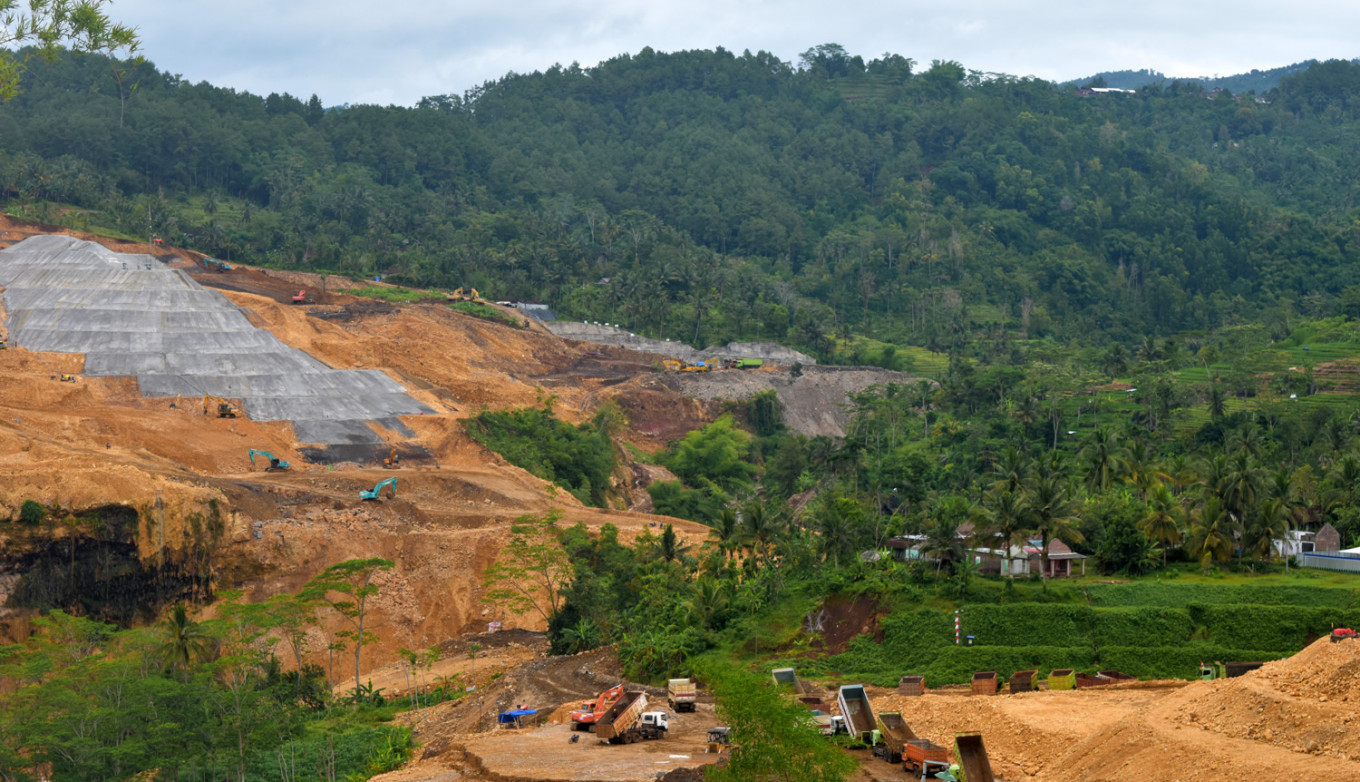Popular Reads
Top Results
Can't find what you're looking for?
View all search resultsPopular Reads
Top Results
Can't find what you're looking for?
View all search resultsIndonesia banks on dams, but at what cost?
Dams help solve water crisis, but may exacerbate climate risk, experts warn.
Change text size
Gift Premium Articles
to Anyone

K
een to store more irrigation water to shore up food security and protect itself from longer climate change-fueled droughts and extreme rainfall, Indonesia has embarked on a dam project that aims see 57 new dams in place by 2024.
But for those in their path, the work has not always brought greater security.
In Central Java province, ongoing work on the 690-hectare Bener Dam has destroyed farmer Gunawan’s small durian fruit plot, robbing him of his income.
The 33-year-old said his land in Purworejo district was bulldozed to make way for the dam, despite not being earmarked for demolition when the government published its plans for the project.
The Rp 2 trillion (US$132 million) dam is set to be finished in 2024.
“I’m sad and also [...] angry,” Gunawan said in the village of Guntur, adding that he used to make Rp 20 million ($1,318) a year selling his durian harvest.
Now, he said, he had little choice but to take on occasional work as a truck driver to make ends meet
“What can we do against the government?” asked Gunawan, one of thousands of small-scale farmers and other people in the area who say they have been uprooted by the dam project.
Facing worsening water security concerns, Indonesia is building more water retention dams, which it says are needed to supply irrigation, reduce the risk of flooding and provide a source of low-carbon hydroelectric power.
But building dams, as with the Bener Dam, is causing its own new challenges, from upending the lives of local people to new losses of forests and agricultural land, according to residents and campaigners.
Deforestation, in particular, could interfere with rainfall patterns and affect the ability of land to hold water, said Ully Artha Siagian, a forest and climate change campaign manager at the Indonesian Forum for the Environment (WALHI), a nonprofit group.
The Bener Dam “will actually add to the burden of the threat of a clean water crisis in the future”, she said. “So, converting forest areas into dams does not answer the problem.”
In response to concerns by campaigners, Dwi Purwantoro, an official at the Public Works and Housing Ministry, said by phone that building dams was important not only for boosting water security but also for better controlling floods.
Competing needs
As climate change impacts strengthen, countries including Indonesia are attempting to be proactive in adapting to coming changes and looking for ways to curb climate-changing emissions, such as by installing renewable energy.
But many of the potential adaptations and emissions-cutting efforts put new pressure on limited land, with competing priorities such as protecting nature, boosting food security, mining minerals needed for the green transition and protecting land rights pitted against each other.
In some cases, the choices made threaten to lead to social unrest, especially if communities find themselves uprooted without consent or adequate compensation. They also raise crucial questions about how to strike a balance among competing “good” uses for land.
Indonesia in 2021 published a climate resilience development policy that outlined four priority areas for action as climate change worsens: agriculture, seas and coasts, health and water.
In Bali, Java and Nusa Tenggara, areas facing water scarcity are predicted to rise from 6 percent in 2000 to 9.6 percent in 2045, according to a 2019 study by the National Development Planning Agency (Bappenas).
Eko Cahyono, a researcher for the Sajogyo Institute, which studies agrarian issues and the environment, said he understood why the government wanted to improve water security, but said that should not come at the cost of people’s livelihoods and rights.
“If this [Bener Dam project] is indeed part of climate change mitigation and adaptation [efforts], how can the government ensure social, economic and ecological justice so that there are no more violations of people’s rights?” he asked.
Land loss
According to a government land procurement plan and project map published in 2019, the Bener Dam will affect a total of 600 ha of land belonging to at least 3,480 people.
In addition, a quarry being built in the area to mine stones for the dam will impact the garden plots of 617 people and an area of 114 ha, the document noted.
Some residents like Gunawan say their land was also destroyed, despite not having been earmarked in the planning documents. They are now demanding compensation as a result.
Purwantoro, the public works official, said that “regarding several residents’ land (being) outside the project map [...] now we are proposing changes to the map so it will be expanded”.
Construction on the Bener Dam was temporarily halted in August 2022 following local protests, according to state-owned construction firm PT Waskita Karya, which is working on the project.
“We still hope that there will be the best solution for the residents,” said company spokesperson Setyawan Nugroho, adding that discussions on compensation were ongoing.
The government has offered compensation ranging from around Rp 60,000 rupiah ($4) to Rp 215,000 ($14) per meter of land depending on the area in question.
Several residents said in interviews that they had refused to accept the terms.
Ully of WALHI said the project had led to “social conflict” in Purworejo because many people had lost their sources of food and green areas that had been in their families for generations.
There have been clashes between residents and police and soldiers doing land surveys, and authorities are seeking six suspects accused of vandalizing a dam project office.
Bener Dam is a national strategic project (NSP), making it a government priority, but critics say that declaring an NSP can result in land being seized or destroyed in the name of development and the public interest.
Dewi Kartika, secretary-general of the Consortium for Agrarian Reform (KPA), urged the government to review its development policy, saying it “has sparked agrarian conflicts in many places”.
Last year, 212 such conflicts were recorded by the KPA, up from 207 in 2021. They took place in 459 villages, affecting at least 346,00 people, she said.
Outlook for dams
The government has cited building dams as a major solution to the country’s water security worries, but hydrology experts have concerns about its approach.
Gunawan Wibisono, a lecturer at Merdeka Malang University, said Indonesia’s dam projects would result in forest loss and that their effectiveness in improving water security could be limited, as sediment carried downstream filled them, and by a lack of focus on recharging groundwater in their design.
None of Indonesia’s planned dam projects are intended to help boost groundwater reserves, according to Heru Hendrayana, a hydrologist at Gadjah Mada University.
“The problem is [...] most [dams] are mostly for the function of collecting, not absorbing, water,” he said.
In the village of Guntur, residents such as Gunawan and Miftakhul Hafid are determined to keep protesting against the Bener Dam, a project they feel is bringing them more problems than benefits.
“The government must ensure [...] that residents’ rights are fulfilled,” said 28-year-old Hafid, a community leader.









